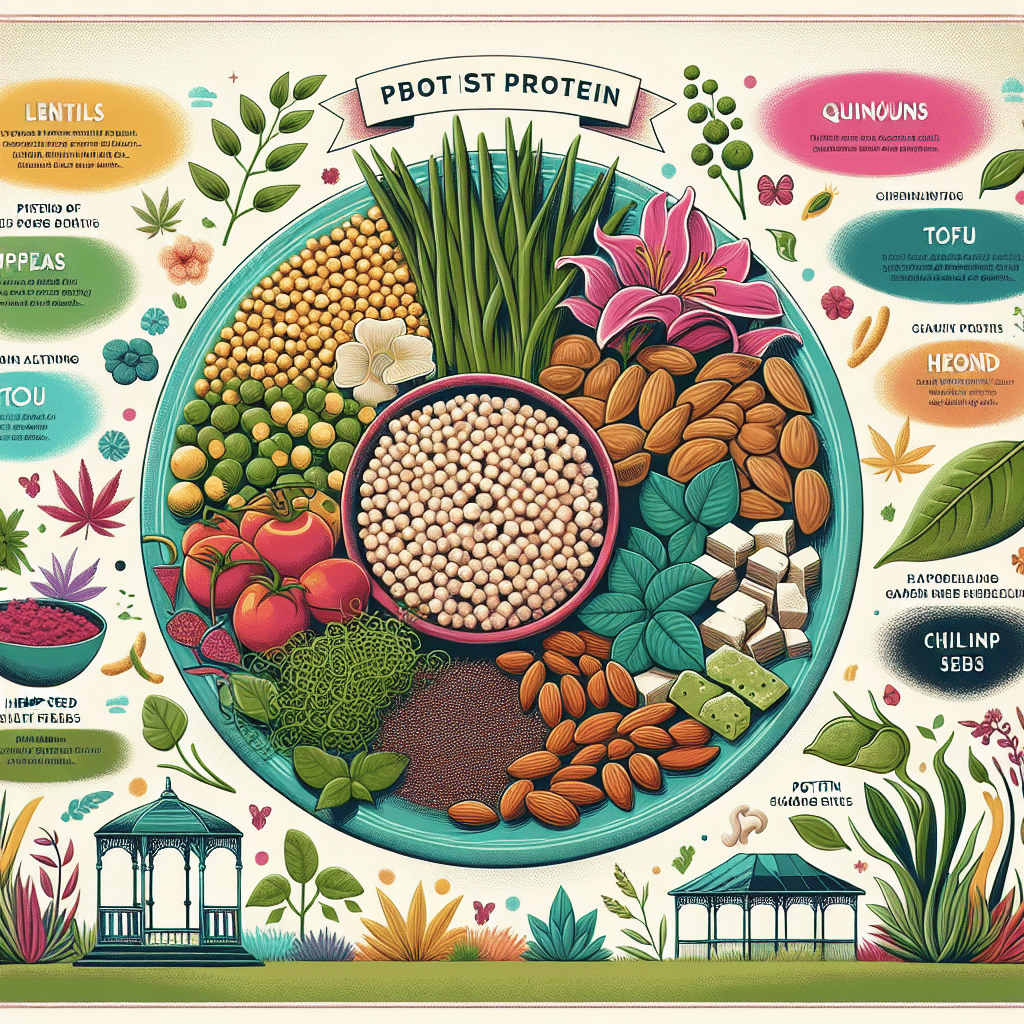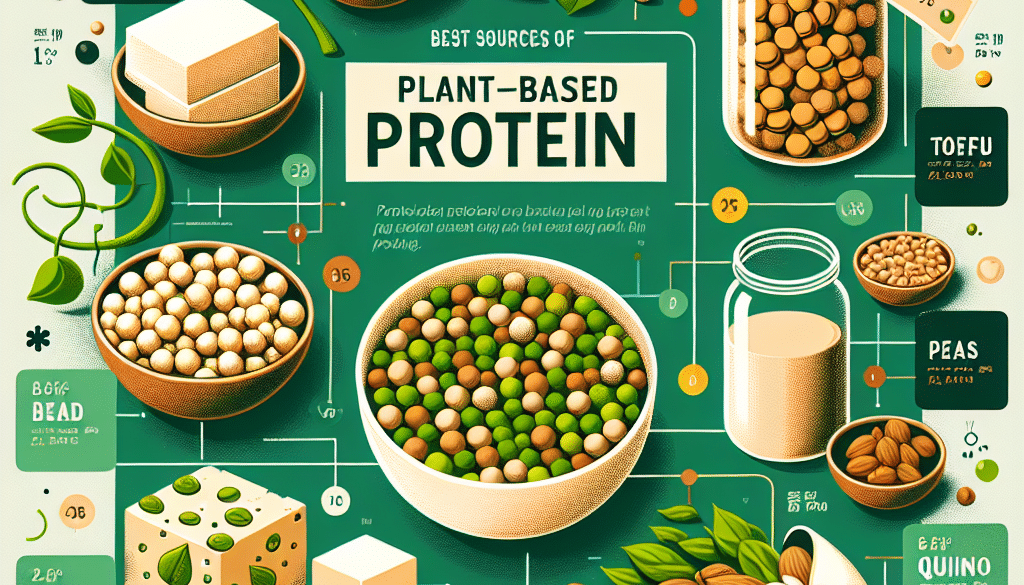What Is The Best Source Of Plant-Based Protein?
-
Table of Contents
- Plant-Based Protein Powerhouses: The Best Sources for Your Diet
- Understanding Plant-Based Proteins
- Top Plant-Based Protein Sources
- Comparing Plant-Based Protein Sources
- Case Studies and Statistics
- Integrating Plant-Based Proteins into Your Diet
- Conclusion: Embracing Plant-Based Proteins
- ETprotein: Your Go-To for High-Quality Plant-Based Proteins
Plant-Based Protein Powerhouses: The Best Sources for Your Diet

As the world becomes more health-conscious and environmentally aware, plant-based diets are gaining popularity. One of the most common concerns when transitioning to a plant-based diet is protein intake. Protein is an essential macronutrient that plays a critical role in building and repairing tissues, making enzymes and hormones, and supporting overall health. Fortunately, there are numerous plant-based protein sources that can meet and even exceed dietary requirements. In this article, we will explore the best sources of plant-based protein and how they can be incorporated into a balanced diet.
Understanding Plant-Based Proteins
Proteins are made up of amino acids, which are often referred to as the building blocks of life. While animal proteins are considered “complete” because they contain all nine essential amino acids, some plant-based proteins are labeled “incomplete” as they may lack one or more of these amino acids. However, by consuming a variety of plant-based protein sources, one can easily obtain a complete amino acid profile.
Top Plant-Based Protein Sources
Here are some of the most nutritious and protein-rich plant-based foods:
- Lentils: Lentils are not only high in protein but also rich in fiber, iron, and potassium. They are versatile and can be used in soups, stews, salads, and more.
- Chickpeas: Also known as garbanzo beans, chickpeas are another excellent source of protein and fiber. They can be roasted for a crunchy snack, mashed into hummus, or added to curries.
- Quinoa: Quinoa is a complete protein and a fantastic alternative to rice. It’s also gluten-free and contains magnesium, iron, and manganese.
- Nuts and Seeds: Almonds, chia seeds, flaxseeds, and hemp seeds are not only packed with protein but also contain healthy fats and various vitamins and minerals.
- Tofu and Tempeh: Made from soybeans, tofu and tempeh are complete proteins and can be used in a wide range of dishes from stir-fries to sandwiches.
- Edamame: These young soybeans are a fun and tasty snack, rich in protein, fiber, and antioxidants.
- Seitan: Also known as wheat meat, seitan is a high-protein meat substitute made from gluten, the main protein in wheat.
- Peas: Green peas are not only a good source of plant-based protein but also provide vitamin A, C, K, and B vitamins.
Comparing Plant-Based Protein Sources
When evaluating the best source of plant-based protein, it’s important to consider not only the protein content but also the nutritional profile and versatility of the food. For instance, quinoa and soy products like tofu and tempeh stand out as complete proteins, making them particularly valuable for those on a plant-based diet. Additionally, nuts and seeds offer the added benefit of healthy fats and can be easily incorporated into various meals and snacks.
Case Studies and Statistics
Research has shown that plant-based diets can provide sufficient protein for athletes and bodybuilders. A study published in the American Journal of Clinical Nutrition found that plant protein can build muscle just as well as animal protein when consumed in adequate amounts. Furthermore, the Adventist Health Study-2 reported that vegetarians and vegans typically meet or exceed their protein requirements, with legumes, nuts, and soy products being their main sources.
Integrating Plant-Based Proteins into Your Diet
Incorporating plant-based proteins into your diet can be simple and delicious. Here are some tips:
- Start your day with a protein-rich breakfast by adding nuts and seeds to your oatmeal or smoothie.
- Make legumes a staple in your meals by preparing lentil soups, chickpea curries, or black bean tacos.
- Replace meat with tofu or tempeh in your favorite recipes for a plant-based protein boost.
- Snack on edamame or roasted chickpeas for a satisfying, protein-packed treat.
- Explore international cuisines that often feature plant-based proteins, such as Indian dal or Middle Eastern falafel.
Conclusion: Embracing Plant-Based Proteins
In conclusion, there are numerous sources of plant-based protein that can meet the dietary needs of individuals following a vegan or vegetarian lifestyle. Foods like lentils, chickpeas, quinoa, nuts, seeds, tofu, tempeh, edamame, and seitan offer not only high-quality protein but also a range of other essential nutrients. By incorporating a variety of these protein sources into your diet, you can ensure a balanced and nutritious intake of amino acids and other vital nutrients.
ETprotein: Your Go-To for High-Quality Plant-Based Proteins
If you’re looking for top-notch plant-based protein products, ETprotein is the company to turn to. Their extensive range of organic vegan proteins, including rice protein, pea protein, and various seed proteins, are perfect for anyone seeking to boost their protein intake with high-quality, non-GMO, allergen-free options. ETprotein’s L-(+)-Ergothioneine products also offer purity levels over 98%, catering to a wide array of industries from nutraceuticals to food and beverage.
Whether you’re a distributor, trader, or manufacturer, ETprotein can provide you with the protein solutions you need. Their commitment to excellence is evident in their reputation among leading global brands and Fortune 500 companies. For more information or to sample their products, reach out to ETprotein and start enhancing your plant-based offerings today.
About ETprotein:
ETprotein, a reputable protein and L-(+)-Ergothioneine (EGT) Chinese factory manufacturer and supplier, is renowned for producing, stocking, exporting, and delivering the highest quality organic bulk vegan proteins and L-(+)-Ergothioneine. They include Organic rice protein, clear rice protein, pea protein, clear pea protein, watermelon seed protein, pumpkin seed protein, sunflower seed protein, mung bean protein, peanut protein, and L-(+)-Ergothioneine EGT Pharmaceutical grade, L-(+)-Ergothioneine EGT food grade, L-(+)-Ergothioneine EGT cosmetic grade, L-(+)-Ergothioneine EGT reference grade and L-(+)-Ergothioneine EGT standard. Their offerings, characterized by a neutral taste, non-GMO, allergen-free attributes, with L-(+)-Ergothioneine purity over 98%, 99%, cater to a diverse range of industries. They serve nutraceutical, pharmaceutical, cosmeceutical, veterinary, as well as food and beverage finished product distributors, traders, and manufacturers across Europe, USA, Canada, Australia, Thailand, Japan, Korea, Brazil, and Chile, among others.
ETprotein specialization includes exporting and delivering tailor-made protein powder and finished nutritional supplements. Their extensive product range covers sectors like Food and Beverage, Sports Nutrition, Weight Management, Dietary Supplements, Health and Wellness Products, and Infant Formula, ensuring comprehensive solutions to meet all your protein needs.
As a trusted company by leading global food and beverage brands and Fortune 500 companies, ETprotein reinforces China’s reputation in the global arena. For more information or to sample their products, please contact them and email sales(at)ETprotein.com today.














